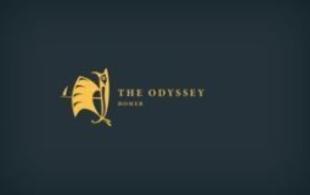
OUP (2016) h/b 354pp £16.99 (ISBN 9780199669103)
Do we really need another translation of the Odyssey? Such a question is misconceived. It is like asking, when there is a perfectly competent recording of Beethoven’s ‘Pastoral’ Symphony, ‘Do we need another recording?’ Works of genius, such as the Odyssey and the ‘Pastoral’, cannot yield all they have to offer to a single translator or a single conductor, however talented. There is always more to be drawn out.
In his thoughtful 18 page introduction to this translation of the Odyssey by Anthony Verity (formerly Master of Dulwich College), William Allan, Classics Tutor at University College, Oxford, comments ‘The ideal effect of an epic performance [by an itinerant bard] is the “enchantment” of the listeners who are transported back to the world of heroes and their mighty deeds.’ In a short preface V., who has translated Theocritus, Pindar and the Iliad in this ‘World’s Classics’ series, writes of his Odyssey, ‘It does not claim to be “poetic”; my aim has been to use a straightforward English register and to keep closely to the Greek, allowing Homeric directness and power to speak for itself.’
V.’s translation succeeds in both respects. Here are eleven lines (5.147—157), chosen at random as an example of V.’s style. Hermes has just given Calypso Zeus’s instruction to let Odysseus continue on his journey:
‘So the mighty slayer of Argus spoke, and went on his way,
and the revered nymph went in search of great-hearted
Odysseus, now that she had heard the message from Zeus.
She found him sitting on the seashore; his eyes were never
without tears, and his sweet life drained away as he grieved
for a way home, since the nymph no longer pleased him.
He spent his nights in her hollowed cavern, but by constraint,
since she desired him, while he had no love for her.
All his days he passed sitting on rocks on the seashore,
tearing at this heart with tears and groans and anguish,
forever weeping and looking out over the restless sea.’
No attempt is made to avoid the formulaic epithets—that is part of the attraction of the original; we know how people or things will be described—there is a permanence about the Homeric world—and feel pleased with ourselves when proved right. It is the very absence of literary polish which gives authenticity to the oral tradition behind the work.
So what particular contribution does V. have to offer to enhance our appreciation and enjoyment of the Odyssey? For your reviewer, it is the fact that his deceptive simplicity allows the hearer/reader to be drawn afresh into this magnificent story of high adventure with its shrewd observations of the human condition and its timeless engagement with the capriciousness of fate over which we mortals have so little control. It does not obscure, but gives space for Homer’s unique genius to reveal itself.
This book, well-produced by OUP, is user friendly. As well as Allan’s helpful introduction, there is a select bibliography. The lines of the translation are numbered to match those of the standard text. Notes offer a brief resume of each book and explanations of characters or allusions which might be obscure, and there is a full index.
Clearly a labour of love, this translation offers an ‘enchanting’ experience and earns V. a well-deserved place among the distinguished translators of the Odyssey.
Ray Morris
